|
|
|
Sort Order |
|
|
|
Items / Page
|
|
|
|
|
|
|
| Srl | Item |
| 1 |
ID:
147078
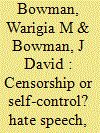

|
|
|
|
|
| Summary/Abstract |
In 2013, the Kenyan government adopted a hybrid censorship strategy that relied on regulation, the presence of a strong security state, and the willingness of Kenyans to self-censor. The goal of this censorship strategy was to ensure a peaceful election. This study examines two issues. First, it investigates steps taken by the Kenyan government to minimise hate speech. Second, it explores how efforts to minimise hate speech affected citizen communications over SMS during the 2013 election. An initial round of qualitative data was gathered (n = 101) through a structured exit interview administered election week. A statistically significant, representative sample of quantitative data was gathered by a reputable Kenyan polling firm (n ≥ 2000). Both sets of empirical data indicate that Kenyan citizens cooperated in large part with efforts to limit political speech. Yet speech was not always completely “peaceful’. Rather, voters used electronic media to insult, offend, and express contentious political views as well as express peace speech. This study argues that the empirical evidence suggests hate speech over text messages during the Kenyan election declined between 2008 and 2013.”
|
|
|
|
|
|
|
|
|
|
|
|
|
|
|
|
| 2 |
ID:
171032
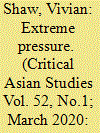

|
|
|
|
|
| Summary/Abstract |
Situated in the emergence of hate speech and anti-racism counter protest in Japan, this article poses two questions: why do activists enact exclusions while attempting to fight against social inequality, and how do interpretations of gender shape activists’ understandings of anti-racism? This article explores three findings: activists conceptualize the risk of being targets of hate speech and abuse as both gendered and racialized; anti-racist activists interpret anti-racism as a practice of redirecting vulnerabilities – a practice that is, itself, gendered; and anti-racist activist communities struggle with ambivalence around masculinity and other “gender problems.” Although gender functions as a key lens through which anti-racism is conceptualized, movements devoid of an intersectional feminist analysis encounter exacerbated difficulties in resolving internal problems such as sexual harassment. This article focuses on the theme of vulnerability, which is enmeshed with the vocabulary of gender. Through analyzing vulnerability, this article offers an ethnographic account to explain why the reproduction of inequalities persist, even within social justice movements that aim to promote equality.
|
|
|
|
|
|
|
|
|
|
|
|
|
|
|
|
| 3 |
ID:
188085
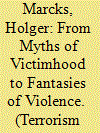

|
|
|
|
|
| Summary/Abstract |
Why is far-right rhetoric so dangerous? In recent years, scholars and policy makers alike have striven to unpack the black box of extremists’ online communication and the rise of far-right violence. Particularly the role of social media in spreading hate speech and fostering radicalization has caught a lot of attention; however, there has been little success in pinning down the drivers of violence. Drawing on the concept of dangerous speech, we take a step back from the violent effects of far-right online communication. Instead, we examine its logical functioning to illuminate the upstream processes that constitute hate and legitimize violence. More concretely, we study how far-right narratives employed on social media mobilize emotions that prepare for the acceptance or even use of violence. Analyzing the argumentative structures of two anti-immigration campaigns in Germany, we find a network of narratives where narratives of imperilment— supported by narratives of conspiracy and inequality—converge into a greater story of national threat and awakening. By constructing a situation of collective self-defense, violence becomes a logical option, even if violent action is not explicitly proposed. Counter-narrative efforts should thus not only focus on hate speech but also address the myths of victimhood, which are constitutive of (violent) palingenetic fantasies.
|
|
|
|
|
|
|
|
|
|
|
|
|
|
|
|
| 4 |
ID:
178390
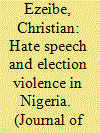

|
|
|
|
|
| Summary/Abstract |
Although research has considered how poor governance, exclusionary politics and electoral malpractice affect election violence, the effect of hate speech on election violence has not received adequate academic attention. Using a mixed methods approach with qualitative dominance, this study examines the effect of hate speech on election violence in Nigeria during the 2011, 2015 and 2019 presidential elections. The article demonstrates that an entrenched culture of hate speech is an oft-neglected major driver of election violence in Nigeria. The study concludes that the implementation of existing anti-hate speech laws presents an opportunity for protecting the rights of minority groups, promoting political inclusion and preventing election violence in Nigeria and beyond.
|
|
|
|
|
|
|
|
|
|
|
|
|
|
|
|
| 5 |
ID:
131482
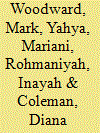

|
|
|
|
|
| Publication |
2014.
|
| Summary/Abstract |
In this paper we explore the ways in which the Indonesian Front Pembela Islam (Islamic Defenders Front-FPI) uses hate speech and demonization to legitimize violent attacks on organizations and individuals it considers to be sinful or religiously deviant, and civil discourse to establish credibility and respectability.
We argue that the use of a discursive frame established by fatwa (legal opinions) issued by the semi-official Majelis Ulama Indonesia (MUI-Indonesian Council of Muslim Scholars) and tacit support from powerful political factions enable FPI to conduct campaigns of demonization and violence with near impunity and to avoid being labeled as a terrorist organization. We elaborate on a distinction between what the Center for Religious and Cross-Cultural Studies (CRCS) at Gadjah Mada University calls the two faces of FPI (Bagir et al. 2010a). The CRCS report distinguishes between civil and uncivil modes of FPI discourse and praxis. The civil mode seeks to establish the organization's credibility in the public sphere. It presents FPI as the ally of authorities in attempts to control deviance and assisting those in need, especially victims of natural disasters.
|
|
|
|
|
|
|
|
|
|
|
|
|
|
|
|
| 6 |
ID:
169031
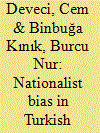

|
|
|
|
|
| Summary/Abstract |
This article analyzes the approach in Turkey on hate speech by evaluating legal regulations, decisions and public responses. We argue that the Turkish case cultivates neither a lenient, nor a restrictive response to hate speech, because a strong nationalist bias seems to be at work in interpreting, penalizing or allowing hate speech. The peculiarity of the Turkish case stems from a prejudice that hate speech might be conducted only against the nation, unity of the state, or the principles of regime, rather than against vulnerable groups or identities. By focusing on the Hrant Dink case among others we try to demonstrate the most striking example of this prejudice.
|
|
|
|
|
|
|
|
|
|
|
|
|
|
|
|
| 7 |
ID:
157725
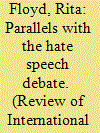

|
|
|
|
|
| Summary/Abstract |
This article argues that public expressions of Islamophobia are best understood as securitising requests (that is, calls on powerful figures/bodies to treat an issue in security mode so that extraordinary measures can be used to combat it), especially in those cases where Muslims are feared and disliked because of the perception that Islamic people are prone to terrorism. This article argues that harmful and derogatory securitising requests targeting racial, ethnic, or religious minorities are on par with hate speech and it highlights the fact that many contemporary societies are now seeking legal protections against such security speech (expressed most notably in the desire to ban Islamophobia). It is from this perspective that this article poses an important research question: With a view to protecting those adversely affected, are legal protections against harmful and offensive securitising requests justified? The research question can be answered by drawing parallels to the existing hate speech debate in legal and political theory. The research reveals that, although the case against legal protections of harmful and defamatory security speech is ultimately more convincing, security speech alone can be so damaging that it should be informed by a number of ethical considerations. This article goes on to suggest three criteria for governing the ethics of requesting securitisation. As such this article fills a lacuna in the ‘positive/negative debate’ on the ethics of security that has engaged with securitisation, but that has failed to consider the ethics of speaking security.
|
|
|
|
|
|
|
|
|
|
|
|
|
|
|
|
| 8 |
ID:
137429


|
|
|
|
|
| Summary/Abstract |
Parallel to two intertwined processes of the politicization of ethnicity, religion and sexuality on the one hand, and the rise of the internet, on the other hand, hate speech has become one of the most topical issues of political debates. Academic interest on this topic has so far focused largely on the questions of (im)possibility of defining hate speech, on the hate speech/free speech dichotomy, and, thus on the possible ways of dealing with this big challenge of our times. This study tries to open a new window by resorting to the concept of human security. It argues that rival understandings of security (traditional or critical) lead to differences in perceptions of threats/harms which in turn lead to different conceptions of hate speech. This argument is illustrated through an analysis of the way the Kurdish issue in Turkey has been tackled in Ekşi Sözlük, one of the most popular web sites in the country.
|
|
|
|
|
|
|
|
|
|
|
|
|
|
|
|
|
|
|
|
|